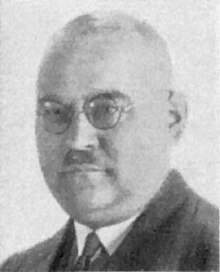Johannes Groß (politician)
Johannes Groß (born December 22, 1879 in Oberwolfach , † March 11, 1954 in Stuttgart ) was a German politician ( center , after the war CDU ).
Live and act
After attending elementary school, Groß learned the tailoring trade. From 1900 Groß was active in the Swiss and German labor movement. The main focus of his activities were tasks in the civil servants and state workers' movement. As a craftsman, he made trips at home and abroad. In order to continue his education he attended economics courses.
In 1912, Groß moved to the Chamber of Deputies of the Kingdom of Württemberg for the first time , to which he was to belong until 1924 after the collapse of the monarchy in Germany in autumn 1918, over the next twelve years.
Politically, Groß began to be active in the Catholic Center Party during the German Empire . In the Reichstag election of May 1924 , he entered the parliament of the Weimar Republic for the first time , in which he then represented constituency 31 (Württemberg). After his re-election in the Reichstag election in December 1924 , Groß belonged to parliament for almost four years until the election in May 1928 , in which he initially lost his mandate. In November 1928, however, he was able to return to the Reichstag in a by-election, to which he now belonged without interruption until November 1933. During this period, his mandate was confirmed four times (in September 1930, July 1932, November 1932 and March 1933) in elections. One of the important parliamentary events in which Groß was involved was the vote on the Enabling Act in March 1933, which was also passed with Groß 'vote .
Groß was also chairman and association manager of the Baden-Württemberg regional association of the German Railway Workers' Union and a member of the central board of the same union. He was also the editor of specialist bodies for many years.
In the spring of 1933, Groß was arrested at the Anhalter Bahnhof in Berlin at the instigation of the Stuttgart criminal police. He remained in custody until June 13, 1933. In August 1944, Groß was arrested by the Gestapo - probably in the course of the grate action .
After the war he belonged to the Christian Democratic Union (CDU).
literature
- Frank Raberg : Biographical handbook of the Württemberg state parliament members 1815-1933 . On behalf of the Commission for Historical Regional Studies in Baden-Württemberg. Kohlhammer, Stuttgart 2001, ISBN 3-17-016604-2 , p. 289 .
Web links
- Johannes Groß in the database of members of the Reichstag
- Johannes Groß (politician) in the online version of the edition files of the Reich Chancellery. Weimar Republic
Individual evidence
- ↑ Kurt Leipner: Chronicle of the City of Stuttgart, 1933-1945 , 1982, p. 29.
| personal data | |
|---|---|
| SURNAME | Great, Johannes |
| BRIEF DESCRIPTION | German politician (center), MdR |
| DATE OF BIRTH | December 22, 1879 |
| PLACE OF BIRTH | Oberwolfach |
| DATE OF DEATH | March 11, 1954 |
| Place of death | Stuttgart |
